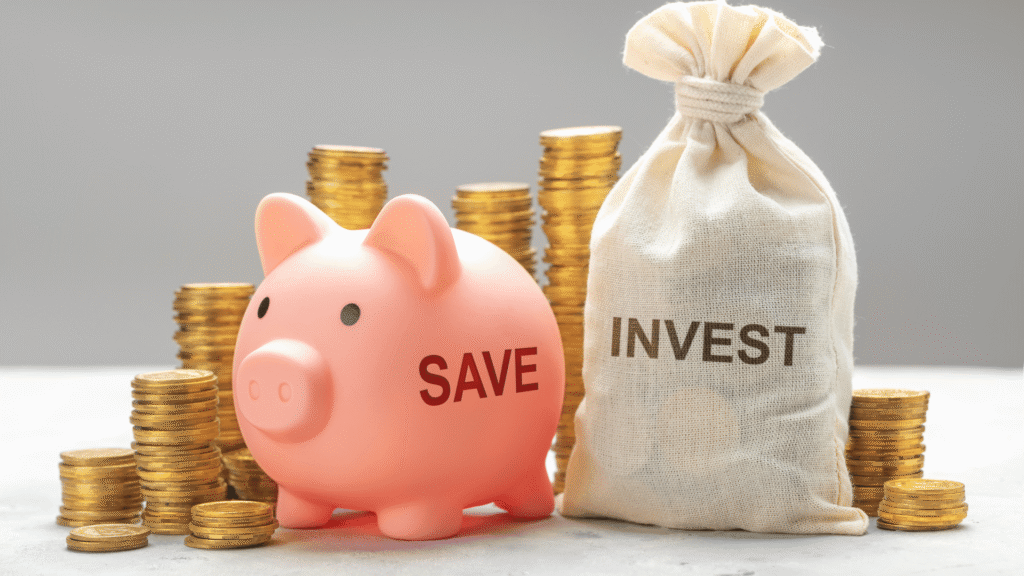Setting aside emergency savings is already a good first step. However, it’s not enough to build real wealth. For long-term projects, it’s better to invest your money and place it in different types of vehicles. Let’s be clear right away: real estate isn’t the only solution available to you! Here are some good reasons to invest your money now and some tips to help you know exactly where to put it.

Financial investment: stop the preconceived ideas!
Think financial investing isn’t for you? Then let’s start by breaking down the stereotypes:
No, you don’t necessarily have to be wealthy to invest your money. Now, investing is open to everyone. It’s no longer reserved exclusively for wealthy clients. Better yet: investing your money when you’re young is an excellent idea!
Things have changed, and it is no longer necessary to have several thousand euros available to invest. Some investments are accessible from just €30.;
Real estate is a haven. However, it is not the only option, and it is not always the most attractive investment. In any case, it is always wiser to diversify your financial assets than to bet everything on property.;
When it comes to financial investments, the risk of capital loss is not necessarily high.. Certainly, some investments are riskier than others. Everything will actually depend on your investor profile and your investment strategy.
To have profitable financial investments, it is not necessary to devote all your time to them. Your money could even grow without you even having to worry too much about it!
5 good reasons to invest your money
Financial investment is different from precautionary savings. It’s part of a longer-term vision and allows you to make money grow to carry out a project or build assets. Still hesitant to get started? Here are some good reasons that might convince you…
Invest to boost your savings and obtain better returns
The French love to save! As proof, the Livret A savings account collection scores continue to break new records. However, while this medium is attractive due to its security and the availability of its funds, it is clear that it does not display a very high interest rate! It is therefore a savings product with low returns. However, while savings sleep peacefully, inflation continues to rise! By cause and effect, leaving your money in a standard savings account for too long causes it to devalue. The more the years go by, the more your purchasing power diminishes.
Investing your money in other financial vehicles makes it more profitable. Interest rates are then higher. What’s more, by choosing to invest in the stock market, it’s possible to obtain capital gains when you resell your securities. This is the positive difference between the purchase price and the sale price of an asset. For example, in 2016, a share of the LVMH group cost €153. In 2021, its price was worth €543.80. Let’s imagine that you bought the equivalent of 10 shares in 2016 (€1,530 invested) and decided to sell them in 2021 (€5,438). You would then have realized a capital gain of €3,908, a return far higher than what a simple savings account could have offered you!
Furthermore, owning shares in a company can also lead to dividends. This is the case when the company generates profits and chooses to remunerate its shareholders proportionally.
Take control of your destiny and make projects a reality.
But why invest your money when you’re young? In fact, it’s an excellent way to achieve long-term goals. In this case, it’s best to establish a strategy from the start. The investment won’t be the same depending on the plans you’ve made. Invested money can be a good starting point for preparing for your retirement, building up a deposit for a future property purchase, financing your children’s education, building your assets, and more.
Limit the effects of inflation
When inflation rises, savings account rates follow suit. However, this isn’t enough to make up for the shortfall. Generally, the returns aren’t enough to offset the effects of general price increases. This is precisely why it’s better to invest your money rather than save. While safety savings are perfectly suited to a low-yield savings account, for the rest of your capital, it’s better to turn to a vehicle offering a better return.
Profit from the rise in financial markets
Stock market crashes, pandemics, natural disasters, corporate takeovers… Current events have major consequences for financial markets. The stock market can soar as well as plummet. It’s by playing with these fluctuations that it’s possible to achieve excellent returns. Of course, this can also lead to significant capital losses. The trick is to put your money in the right place at the right time.
Note, however, that even with their ups and downs, financial markets have an upward trend. Their growth has been constant for nearly 40 years. Of course, past performance is no guarantee of future returns. However, diversifying your investments across different vehicles and investing for the long term helps limit the risk of financial losses. This is a very good way to obtain returns that are often better than those of traditional savings accounts.
What’s more, in the digital age, investing is much simpler than it used to be. It’s no longer necessary to go to a bank to invest your money. Of course, financial advisors remain available to guide you in managing your portfolio. However, orders can also easily be placed remotely. You’re free to invest any amount from anywhere, at any time, and in a much more responsive manner!
Get involved in supporting a cause or project
B Beyond a certain expected return, investing your money can also be a symbol of commitment. It’s a very good way to participate in economic life and certain entrepreneurial projects: some individuals therefore choose to invest their money in companies or start-ups with which they feel they share values. The benefit is then twofold: investing allows you to make your money grow while supporting a company you believe in. However, in this area, you will be spoiled for choice: on the financial markets, all sectors are present!
Now, to meet this motivation, it is also possible to access thematic portfolios.. Some of them are, for example, driven by environmental or social criteria. It is then a question of giving meaning to an investment, by each of us participating at our level in the preservation of nature, health, equality, etc. The idea is quite simply to find high-performing funds in line with your personal convictions.
How to invest your money?
6 good tips for being a good investor
- First of all, even though the returns on financial markets may be higher, it is still essential to keep some savings aside. This is called precautionary savings.
- Your goals should also be defined in advance. You will not make the same investments depending on your plans and investment horizon.
- Start by defining your investor. Some people are more adventurous than others. Some like risk, while others prefer to opt for a less attractive return but avoid a few cold sweats!
- Get trained and supported! You don’t become a financial expert overnight. If you’re not a financial market specialist, don’t hesitate to entrust the management of your portfolio to an expert. They’ll provide you with sound advice, save you stress, and save you time.
- Don’t invest all your money at once. Because it’s impossible to predict with certainty whether markets will rise or fall, it’s best to spread out your entry point to protect yourself as much as possible from fluctuations.
- Mentally prepare yourself for the ups and downs of the market. This will help you stay on track with your strategy, rather than withdrawing your money before your previously defined investment horizon. Avoid rushing into action and instead take a long-term view.
10 Places to Invest Your Money
Now that you are fully aware of the good reasons to invest your money, let’s quickly look at the different possibilities available to you.
- Investing in an SCPI (Société Civile de Placement Immobilier): this involves investing in real estate without having to deal with rental management. The returns are attractive. They allow you to benefit from the dynamism of the real estate market without worrying about the constraints associated with direct property purchases. The income is regular and allows you to build up assets without worrying about the uncertainties of manageme.t;
- Investing in life insurance: the objective is rather asset-based. It involves building up capital by making one-off or scheduled payments and diversifying your investment vehicles. Life insurance then allows you to transfer assets under advantageous tax conditions, or to be exempt from taxation on interest.
- Investing your money in a PER (Retirement Savings Plan): This vehicle collects sums paid in and locks them in until retirement. The payments made are tax-deductible. This is an excellent way to build up an annuity.
- Investing in rental property: Real estate investment involves buying a property and then renting it out to generate additional income. It’s also a great way to build up your assets while taking advantage of certain advantageous tax schemes (Pinel, LMNP, Malraux, etc.).
- Buying stocks. Stocks are shares in companies. They can be bought and sold on the stock market. They allow you to earn capital gains or receive dividends. The price of a stock is determined by the law of supply and demand.
- Investing in a PEA (Share Savings Plan): This vehicle allows you to invest in European markets, purchasing shares in a beneficial framework. It is an excellent way to benefit from reduced taxation while benefiting from the growth of the financial markets.
- Investing in bonds: A bond is a debt instrument, primarily issued by a government, local authority, or company. By investing in this instrument, you become a creditor. Your capital is returned to you at a predetermined maturity date. During the investment, you are periodically paid a fixed or variable interest rate.
- Investing in exotic investments, rt objects, watches, fine wine… All of these are alternative investments that tend to increase in value with age. They are therefore also considered financial investments and allow you to diversify your assets;
- Investing in Private Equity: Also known as private equity, private equity involves financing unlisted companies. The investor’s motivation is often twofold: to achieve attractive performance and to contribute to a concrete economic utility.
- Investing according to certain values and convictions, socially responsible investment (SRI) allows you to invest your money according to certain financial and extra-financial criteria (environmental, social, etc.).


